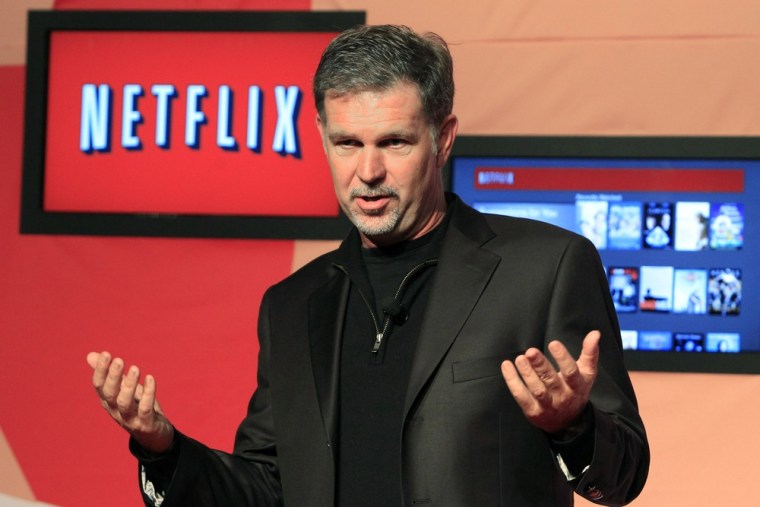Hollywood, which embraced Netflix Inc just a few years ago as a savior, is moving quickly to stanch the growth of one of the media's newest, biggest stars.
Senior executives at three of the big six television and movie studios said they were seeking ways to contain Netflix — from delaying when Netflix can make new DVDs available to rent to raising the prices for digital programs.
"The problem is that Netflix is not the company we thought it was when we started doing these deals a few years ago. It has changed," said a studio executive who requested anonymity because the studio's discussions were confidential.
Netflix, whose stock has jumped nine-fold over the past two years, is a leader in U.S. DVD rentals with its service that sends movies and TV shows through the mail. Its streaming service is also growing quickly, and accounts for one-fifth of U.S. Web traffic in peak hours.
Studio executives have expressed disbelief over some of Netflix's Hollywood content coups, like its 2008 deal with Liberty Media Corp-owned Starz to offer films from Sony Corp and Walt Disney Co for $20 million to $30 million. That deal put Netflix's streaming service on the map for a fraction of what cable operators had paid Starz.
"The deal Starz did to give those movies away for $30 million obviously makes no sense. There's a day coming shortly when that deal expires. How do Starz and Netflix address the next deal?" News Corp Chief Operating Officer Chase Carey said this week at the Reuters Global Media Summit.
Media executives also worry Netflix could bring on a re-run of what happened in the music business when Apple Inc, maker of the iPod, wound up dictating prices.
"Timing really matters," said Strauss Zelnick, the chairman of Take-Two Interactive at the summit. Zelnick said studios, to protect profits, must be careful to maintain control over when movies and TV shows are released on DVD or to cable. This is commonly referred to as windowing.
"Windowing is just a fancy word for price discrimination," he said.
Netflix, with deep pockets and a willingness to pay heavily for content, is succeeding where Google Inc, Apple and studios have so far failed — developing a viable business for digital movies and films.
Scenarios under review, according to executives, include curtailing Netflix's influence by delaying further the 28 days Netflix now waits to get newly released DVDs from some studios. Another is raising prices Netflix pays for digital rights.
"I don't think long-term the 28-day window is viable for the industry," said another senior studio executive who was also involved in confidential talks with Netflix and asked not to be named.
"Either push it out further or don't concede as much on price. We're looking at a better way to slice it."
Time Warner Inc Chief Executive Officer Jeffery Bewkes recently said extending the delay to Netflix was under consideration. "The question of whether we ought to go longer is very much under scrutiny. It may well be a good idea," he said on a recent call with analysts.
And a source familiar with Fox said that studio is also evaluating the 28-day window.
Pay TV operators, which spend heavily on studio fees, are also pressuring studios that offer cut rates for distribution on Netflix.
"Their deal with Netflix absolutely does affect our relationship," said an executive of one of Starz's largest pay TV partners, who asked not to be named because the source was not authorized to speak on behalf of the company.
"You can't sell your product to one distributor for pennies on the dollar and then expect other distributors to pay you dollars for your product."
The fear is that audiences will eventually dump cable or satellite service and simply stream TV shows and movies through Netflix — if Netflix can offer enough content.
In today's terms, Netflix pays Starz less than 15 cents per month for each of its roughly 17 million subscribers, while TV operators pay Starz $2 per subscriber per month, or about $1.2 billion as of 2009.
Speaking at a recent conference, Netflix Chief Content Officer Ted Sarandos dismissed the idea that his company is a threat to pay TV operators. "I think we're an absolutely complementary product to cable."
When it is time to renegotiate, Starz will likely need to extract "many multiples" of what Netflix paid for the 2008 deal or "risk making a pretty significant hit to their traditional business," the cable operator executive said.
Analysts said cable operators could either drop Starz entirely or pull back from promoting it to viewers in response to the Netflix threat.
Meanwhile, Netflix's streaming software is on more devices than that of any other company in digital media. And in August it paid $1 billion to license films from Epix, a movie channel formed by Viacom Inc and Metro Goldwyn Mayer.
